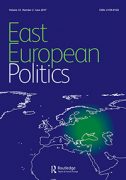Co-authored with John Beyer and published in East European Politics, this article asks what the impact is of geopolitical competition on conflict resolution and democratisation in the context of extensive and multi-directional linkages and leverage?
Our analysis demonstrates of the Moldova and its Transnistrian conflict demonstrates that state weakness simultaneously provides the scope for external leverage and limits its effects. The EU (and US), on the one hand, and Russia, on the other, have used their respective leverage relative to their level of cooperation or rivalry in the wider global context. Long existing and newly built linkages channel this geopolitical relationship which remains the main factor in conflict management and democratisation in Moldova.
This article is an open-access publication.

